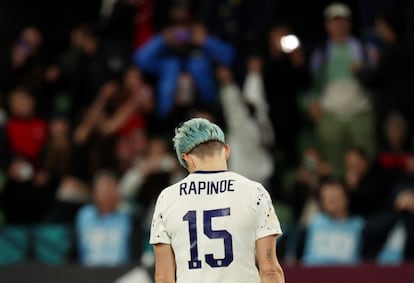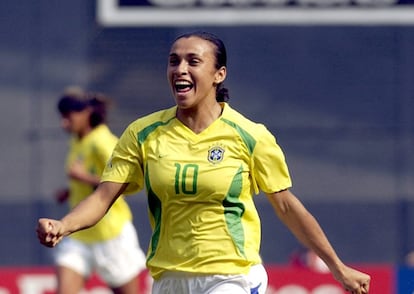Rapinoe and Marta say goodbye, but their legacy remains for a new generation
Two pioneers of women’s soccer and the fight for equality off the field are hanging up their boots after the early elimination of their teams at the World Cup


Nobody wants sad farewells. Nobody wants to miss a decisive penalty. No one wants to end their career after a bittersweet defeat. “Soccer can be cruel sometimes,” said Megan Rapinoe after the USA lost a penalty shoot-out against Sweden that ended their hopes of becoming the first team to win the World Cup three times in a row and marked the first time in history the reigning champions had failed to make at least the semi-finals. Rapinoe won the Golden Ball in 2019, had won two world titles with the national team was awarded the Presidential Medal of Freedom last year — a measure of how she has transcended the sport that she has now bid farewell to. Rapinoe has been relentless in her fight for the rights of minorities, LGBTQI+ people, equal pay, and the visibility of mental health issues. Now, she is stepping aside and stepping away from the playing field.
The World Cup in Australia and New Zealand has reminded us that legends are not eternal. But their legacy is. The early exit of the USA, the pioneer of women’s soccer, is not the only one that brought down the curtain on intergenerational reference points. Brazil, who again underperformed and were knocked out in the group stage, will bid farewell to Marta Vieira, the perpetual Number 10 and the side’s most iconic player. For many she was simply Marta. No last name was needed. She went from being called Pelé in a skirt to putting a name and a face to women’s soccer. Marta symbolizes the fight against institutions, against FIFA and against her own federation. And against the press, to whom she spoke out before what would be her last appearance against Jamaica. “When I started playing I didn’t have a women’s idol. You didn’t showcase women’s soccer,” she tearfully told journalists. “Today people stop us in the street. They tell us ‘my daughter adores you, she wants to be like you.’ We have opened doors for equality,” said Marta, who first played in a World Cup in 2003, this being her sixth tournament.
👏🏼 from both @beckysauerbrunn and @alexmorgan13 ! I don’t know when we will have our first trans member of the @USWNT but rest assured we are ready and they will be taken care of, supported, celebrated most important, not alone. 🏳️⚧️ ❤️ https://t.co/Qn6c7r5LJH
— Megan Rapinoe (@mPinoe) February 9, 2023
Rapinoe, a pioneer in equal rights
Rapinoe has always been easy to recognize due to her short pink hair — now with greenish tones — and by her elaborate and technical style of play. Having worn the number 15 and the captain’s armband, she is a midfielder with one obsession: scoring goals. Off the pitch, she is a pioneer in the fight for equal pay and the rights of minorities. She famously challenged Donald Trump after the USA won the World Cup in 2019. “I’m not going to the fucking White House,” she said. After lifting the World Cup, she delivered a speech in front of thousands of people attesting to the social legacy she was building: “It’s our responsibility to make this world a better place […] Yes, we play sports. Yes, we play soccer. Yes, we’re female athletes. But we’re so much more than that. You’re so much more than that.”
Rapinoe marked a before and after for LGBTQI+ women in soccer. In 2012, in the lead-up to the London Olympics, she openly explained that she was gay in Out magazine by talking about her relationship with Australian player Sarah Walsh. Years later, in 2020, she married basketball player Sue Bird. Since then, she has led various campaigns against homophobia and transphobia and, above all, in defense of minors. In 2022, Rapinoe took to the field in Texas with a powerful message: Protect Trans Kids. On the field, her gestures were closely watched. In 2016, she supported NFL star Colin Kaepernick’s campaign to take a knee at the playing of the U.S. national anthem as a protest against police violence. Like Kaepernick, Rapinoe knelt before league games.
In 2020, her campaign for equality took on another dimension with Equal Pay for Equal Play. Her militant activism — she has described herself as a “walking protest” — against pay inequality led to an agreement being reached with the U.S. Soccer Federation in February last year to compensate female players on the U.S. national team. Historically, men were paid $5,000 per game, while women were only paid if they beat teams ranked inside FIFA’s top 10. After the case was taken to a federal body, officials approved a payout of $24 million: $22 million to be distributed to the active players, and the other $2 million when they retired. With Rapinoe as the leader of the U.S. national team, they not only achieved unbeaten records on the field, but also social advances off it.

Marta, the World Cup record-breaker
Marta was taught that it was not normal for a girl to play soccer. But she never wanted to follow that lesson. A fast striker, in the traditional Brazilian mold, dribbling and dribbling. At the age of 14, she traveled for three days by bus to Rio de Janeiro to turn out for Vasco de Gama, in pursuit of her dreams. Four years later, she made the move to Europe, and since 2017 she has been playing for Orlando Pride. After a career spanning more than two decades, she is Brazil’s overall top scorer with 115 goals, more than the 77 scored by Pelé and Neymar and the top scorer at the World Cup, female or male, with 17 goals in 20 matches, one ahead of Miroslav Klose (16).
Marta shifted the goalposts for an entire generation and those that are coming through. Revolutionary in front of the microphones and on the field, since 2019 she has refused to wear boots sponsored by sports brands with the aim of raising awareness of the financial disparity they offer men and women. “There’s not going to be a Formiga forever. There’s not going to be a Marta forever. There’s not going to be Cristiane. The women’s game depends on you to survive. Think about that. Value it more. Cry in the beginning so you can smile in the end,” she said after the round of 16 elimination to hosts France at the 2019 World Cup.
Marta was addressing the girls taking up the sport, the future of the women’s game. While both historic players are ending their careers on the pitch, other young stars are taking their first international steps. South Korea’s Casey Phair (16) is the youngest player to be called up for the World Cup in Australia and New Zealand. She is followed by Giulia Dragoni (16), who made her debut with the Italian national team and became its new star by leading from midfield. Ary Borges, Linda Caicedo, Salma Paralluelo, Alyssa Thompson… young players who have made a mark at the World Cup. Rapinoe and Marta were always much more than footballers. As players, their journey ends here, but women’s soccer continues to grow. As Marta summed up: “For them, it’s just the beginning, for me, it’s the end.”
Sign up for our weekly newsletter to get more English-language news coverage from EL PAÍS USA Edition
Tu suscripción se está usando en otro dispositivo
¿Quieres añadir otro usuario a tu suscripción?
Si continúas leyendo en este dispositivo, no se podrá leer en el otro.
FlechaTu suscripción se está usando en otro dispositivo y solo puedes acceder a EL PAÍS desde un dispositivo a la vez.
Si quieres compartir tu cuenta, cambia tu suscripción a la modalidad Premium, así podrás añadir otro usuario. Cada uno accederá con su propia cuenta de email, lo que os permitirá personalizar vuestra experiencia en EL PAÍS.
¿Tienes una suscripción de empresa? Accede aquí para contratar más cuentas.
En el caso de no saber quién está usando tu cuenta, te recomendamos cambiar tu contraseña aquí.
Si decides continuar compartiendo tu cuenta, este mensaje se mostrará en tu dispositivo y en el de la otra persona que está usando tu cuenta de forma indefinida, afectando a tu experiencia de lectura. Puedes consultar aquí los términos y condiciones de la suscripción digital.








































